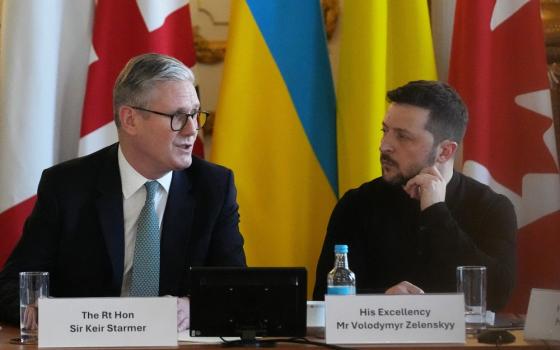A bird sits on a cross amid newly made graves at a cemetery near Mariupol, Ukraine, May 15. (CNS/Reuters/Alexander Ermochenko)
So much energy is being expended to urge Pope Francis to justify violent resistance. The latest episode of this is the war in Ukraine. Journalists, scholars, politicians and some religious continue to press the pope to join the chorus of people perpetuating the violent dynamic.
My sense is that the pope is trying to shift our gaze. It is a shift that he senses Jesus models. A shift toward pastoral accompaniment and a focus on how we might break the violent dynamic. It is not about condemning or judging people in very difficult situations, like some Ukrainians who choose to take up arms in violent defense of their country. It affirms and admires their willingness to take a high-risk stand against injustice rather than to be passive. At that same time, it is also not about justifying methods of war and enabling the violent dynamic to perpetuate and spread.
Francis speaks of accompaniment as the way of God, as in his March 20 Angelus address: "God trusts us and accompanies us with patience. He does not get discouraged, but always instills hope in us. … He does not keep track of your shortcomings but encourages your potential. … In this way God accompanies us: with closeness, mercy, and tenderness."
Such accompaniment is being done in a variety of creative, courageous, nonviolent ways by Francis as well as by Ukrainians and others. It also includes humanitarian resource provision, identifying credible messengers and persistent needs-based diplomacy, coalition building, consistent public statements, impacting Russian leaders' sources of power, prayer and shared physical risk.
Advertisement
Examples of Ukrainian nonviolent action include them blocking convoys and tanks, and standing their ground even as warning shots were fired in multiple towns. In Berdyansk and Kulykіvka, people organized peace rallies and convinced the Russian military to get out. Hundreds protested the abduction of a mayor, and there have been protests and refusals to shift to the ruble in Kherson to resist becoming a breakaway state.
Ukrainians have fraternized with Russian soldiers to lower their morale and stimulate defections. Ukrainians have courageously evacuated many people from dangerous areas. The Ukrainian League of Mediators is helping address increasing polarization within Ukrainian families and communities, in order to minimize the violence.
Russians have participated in numerous anti-war protests, and around 15,000 people have been arrested. Journalists have interrupted and resigned from state TV. Nearly 100,000 Russians from a variety of sectors have signed petitions to end the war. Russians from all parts of society have spoken out against the war — from members of the military and connected to the foreign ministry to members of the Russian oil industry and billionaires, as well as nearly 300 Russian Orthodox clerics. Meanwhile, hundreds of soldiers have refused to take part.
There are additional ways we can support peacebuilders and nonviolent activists in Ukraine by creating coordination hubs with diplomatic, legal and material assistance; amplifying their stories; supporting unarmed civilian protection units already on the ground; sending waves of peacebuilder or religious leader delegations to Kyiv and perhaps other cities in Ukraine; and encouraging a focus on diplomatic solutions.
Russian Orthodox Patriarch Kirill of Moscow and Metropolitan Hilarion of Volokolamsk, head of external relations for the Russian Orthodox Church, participate in a video meeting with Pope Francis and Swiss Cardinal Kurt Koch, president of the Pontifical Council for Promoting Christian Unity, March 16. (CNS/courtesy Russian Orthodox Church)
For Francis, accompaniment is about not perpetuating the violent dynamic as much as possible.
"There was a time, even in our churches, when people spoke of a holy war or a just war," the pope told Russian Orthodox Patriarch Kirill in their March 16 video meeting. "Today we cannot speak in this manner. A Christian awareness of the importance of peace has developed. Wars are always unjust, since it is the people of God who pay. Our hearts cannot but weep before the children and women killed, along with all the victims of war. War is never the way."
At the same time, the pope is not calling us to passivity or surrender in the face of aggression, as he made clear in his message for the 2017 World Day of Peace. As he told an Italian women's group in March: "The real answer is not more weapons, more sanctions, or more political-military alliances," but rather a different approach, "a different way of governing the world." What is the way about? Francis points to the school of Jesus, of Gandhi and particularly of "women who have cultivated and cherished life."
Francis invites us into recognizing conflict as a process with a long-term view, both forward and backward.
During a press conference in April as he flew back from Malta, Francis said: "They fought for the strategy of peace. … Not by chance, at the beginning of the Bible, there is this problem: the 'Cainian' spirit to kill instead of the spirit of peace."
These schools and models illuminate how there may be other ways of defense or resistance to aggression that are more nonviolent, and also perhaps more effective at saving more lives.
In their 2011 volume, Why Civil Resistance Works, researchers Erica Chenoweth and Maria J. Stephan analyzed more than 300 contemporary cases and showed that nonviolent resistance is twice as effective as violent resistance and at least 10 times more likely to lead to durable democracy, including against authoritarians. Additional research has corroborated these patterns. This is notable in light of many claims that violent resistance is necessary to defend democracy. Francis invites us into recognizing conflict as a process with a long-term view, both forward and backward.
Such research shows why war not only makes it at minimum harder for a durable democracy but also is "the suicide of humanity" and a defeat for humanity, as Francis exclaims. War, therefore, is not consistent with a 'humanitarian' initiative or activity in accord with human dignity. Pope Francis explains that war is a "stinging defeat before the forces of evil," rather than a necessity to confront evil.
Local residents gather outside an apartment building damaged during Ukraine-Russia conflict in the southern port city of Mariupol, Ukraine, May 15. (CNS/Reuters/Alexander Ermochenko)
Yes, Russian leaders invaded Ukraine and bear principal responsibility for the war. Kirill is also enabling this violence and the traumatization of the Ukrainian people. All leaders involved in diplomatic negotiations will need to make significant alterations to end the war, save lives, and create space to build a new future. Francis is trying to influence these and other key stakeholders in the conflict, yet he will need our support, collaboration and, especially, shared focus.
In turn, it seems Francis invites our focus to center on accompaniment and breaking, interrupting the logic or dynamic of violence, rather than justifications for war. This is what will more likely prevent and limit war, as well as help us to prioritize abolishing war rather than regularly trying, futilely, to 'humanize' war.
As Francis explained in his March 27 Angelus address: "Before the danger of self-destruction, may humanity understand that the moment has come to abolish war, to erase it from human history before it erases human history!"
Pointing to statistics that show half of all Ukrainian children are now displaced, the pope said this is what it means to destroy the future, "causing dramatic trauma in the lives of the smallest and most innocent among us."





